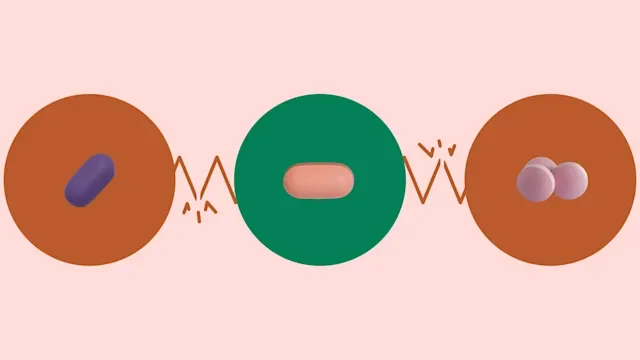Key takeaways:
There’s evidence that statins may cause small amounts of weight gain.
Researchers are still studying the link between statins and weight. But diet changes people make while taking statins may lead to an increase in weight.
You can prevent weight gain while taking statins by eating a high-fiber diet, exercising regularly, and getting enough sleep.
Statins are a cholesterol-lowering medication. They can reduce LDL cholesterol (low-density lipoprotein or “bad” cholesterol) by 20% to 45%.
High cholesterol contributes to the buildup of fatty deposits (plaque) in blood vessels. This process is called atherosclerosis. When atherosclerosis blocks off blood flow it can cause a heart attack or stroke. Statins are often prescribed to help treat atherosclerotic cardiovascular disease (ASCVD).
If your healthcare professional recommends starting a statin, you may worry about potential side effects, like weight gain. Let’s go through the evidence to see if taking a statin can make you gain weight.
Do statins cause weight gain?
Maybe. There’s some evidence that statin use is associated with weight gain. One study found that people who took statins gained 3 kg to 5 kg (6 lb to 11 lb) compared with people who didn’t take statins over a 10-year period.
But not everyone who takes a statin will experience weight gain. And in many cases, the benefits of using a statin outweigh the risk of possible side effects.
Factors contributing to weight gain while on statins
Researchers are still studying the link between statins and weight gain. But there are a few reasons why statin use might affect your weight.
Diet changes
Changes in diet may explain why people gain weight while taking statins. One study found that people taking statins ate more calories and fat compared with people not taking statins. But it’s not clear what’s causing that change in diet. In the past, researchers thought that starting a statin might give people a false sense of security. They believed that people gave up trying to control cholesterol through diet because they were taking medication for it.
However, more recent research suggests that statins may decrease levels of leptin in the body. Leptin is a hormone that affects appetite. Lower levels of leptin can cause people taking statins to feel less full and explain why they may eat more.
Muscle aches
You may have heard that statins can cause muscle pain and cramps. Up to 25% of people taking statins report muscle pain. Muscle pain may prevent you from being as active as you would like. And a decrease in physical activity can make it easier to gain weight.
Read more like this
Explore these related articles, suggested for readers like you.
But studies have shown that only about 10% of muscle pain in people taking statins is caused by the statin itself. This means that most people taking a statin will not experience muscle aches due to the statin. So muscle aches may not fully explain why some people gain weight on statins.
Tips for managing your weight while taking statins
Maintaining a weight that promotes health can reduce your risk of many health conditions including ASCVD. A 5% to 10% reduction in weight can lower cholesterol and decrease the risk of heart attack and stroke.
Follow these tips to help manage your weight while taking statins.
Eat a high-fiber diet
There are lots of benefits to including high-fiber foods in your diet. You probably know that fiber is important for digestion, but it can also improve your heart health. Soluble fiber found in foods like oats, flaxseed, and beetroot, can help lower your cholesterol. Eating fiber-rich foods can also help with weight loss.
Stay active
Regular physical activity has many heart-healthy effects. It can increase HDL cholesterol (high-density lipoprotein or “good” cholesterol). Exercise can also support weight loss or help you maintain your current weight. Try to stick to an exercise routine to prevent weight gain on statins. If you’re just getting back into regular exercise, start slow and make an exercise plan to stay on track.
Get more sleep
Most adults need between 7 and 9 hours of sleep per night. If you routinely get less than that, it can be difficult to maintain a weight that’s good for your overall health. Lack of sleep increases appetite. It can also make you more likely to reach for high-calorie foods. Try keeping a regular sleep schedule to support your weight-management goals.
Are there alternatives to statins?
Statins are usually the first-line treatment for high cholesterol. That’s because there’s so much data showing that people at risk of cardiovascular disease benefit from taking them.
But if you’re not able to take a statin, there are alternative medications for lowering cholesterol including:
Ezetimibe (Zetia): Zetia makes it harder for the gut to absorb cholesterol in the foods you eat. It can lower LDL cholesterol by 15% to 20%.
PCSK9 inhibitors: PCSK9 inhibitors are monoclonal antibodies that work by binding to PCSK9 proteins. Normally, PCSK9 proteins make it harder for the liver to remove LDL cholesterol from the bloodstream. PCSK9 inhibitors like Repatha and Praluent block PCSK9 and allow the body to lower cholesterol levels.
Bempedoic acid (Nexletol): Nexletol is a new type of cholesterol-lowering medication. It works in the liver to decrease production of LDL cholesterol. Nexletol is FDA-approved to help lower cholesterol and reduce the risk of heart attack and stroke.
Sometimes these medications are added to statin therapy to help lower the levels of LDL cholesterol. In other cases, these medications may be used instead of a statin.
The bottom line
Statins play an important role in preventing and treating atherosclerotic cardiovascular disease. Most people have no negative side effects from taking a statin. But there’s some evidence that statin use is linked to slight increases in weight. It’s not clear how statins affect weight, but it may be due to dietary changes.
You can reduce your risk of weight gain on statins and improve your heart health by eating a high-fiber diet, staying physically active, and getting enough sleep. If you can’t take statins, your healthcare professional may recommend an alternative cholesterol medication.

Why trust our experts?


References
American Heart Association. (2024). Fiber up, slim down.
Blumenthal, R. S., et al. (2020). Bempedoic acid for LDL-C lowering: What do we know? American College of Cardiology.
Brown, J. D., et al. (2016). Effects on cardiovascular risk factors of weight losses limited to 5–10%. Translational Behavioral Medicine.
Cholesterol Treatment Trialists’ Collaboration. (2022). Effect of statin therapy on muscle symptoms: An individual participant data meta-analysis of large-scale, randomised, double-blind trials. The Lancet.
Cox, C. E. (2017). Role of physical activity for weight loss and weight maintenance. Diabetes Spectrum.
Danaf, J. A., et al. (2016). Ezetimibe: The lower the LDL-C, the better (even for total cardiovascular events). American College of Cardiology.
Esperion Therapeutics, Inc. (2024). Nexletol (bempedoic acid) tablets, for oral use [package insert].
Gotto, A. M., Jr. (2002). Statins: Powerful drugs for lowering cholesterol. Circulation.
Greer, S. M., et al. (2014). The impact of sleep deprivation on food desire in the human brain. Nature Communications.
Hajar, R. (2019). PCSK 9 inhibitors: A short history and a new era of lipid-lowering therapy. Heart Views.
Hanlon, E. C., et al. (2011). Quantification of sleep behavior and of its impact on the cross-talk between the brain and peripheral metabolism. Proceedings of the National Academy of Sciences.
Hirschkowitz, M., et al. (2015). National Sleep Foundation’s sleep time duration recommendations: Methodology and results summary. Sleep Health.
Huffman, T. F., et al. (2013). Statins for the primary prevention of cardiovascular disease. Cochrane Database of Systematic Reviews.
Phan, B. A. P., et al. (2012). Ezetimibe therapy: Mechanism of action and clinical update. Vascular Health and Risk Management.
Ruiz-Ramie, J. J., et al. (2020). Effects of exercise on HDL functionality. Current Opinion in Lipidology.
Singh, P., et al. (2018). Statins decrease leptin expression in human white adipocytes. Physiological Reports.
Soliman, G. A. (2019). Dietary fiber, atherosclerosis, and cardiovascular disease. Nutrients.
Sugiyama, T., et al. (2015). Is there gluttony in the time of statins? Different time trends of caloric and fat intake between statin-users and non-users among US adults. Journal of the American Medical Association Internal Medicine.
Vinci, P., et al. (2021). Statin-associated myopathy: Emphasis on mechanisms and targeted therapy. International Journal of Molecular Sciences.

















